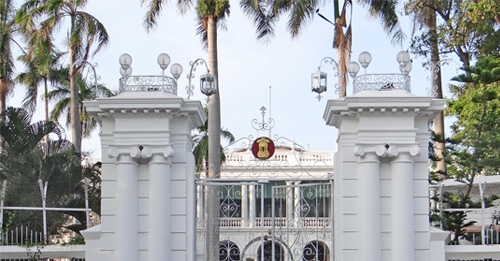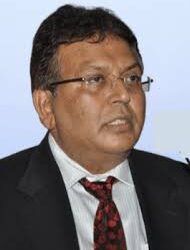K. Veeramani
Democratic polity of State prevails in many countries and they are of varied types. They are founded on the basis that the rulers must be elected with the mandate of the people of their respective countries and governing powers must be vested with them. These are the basic tenets in any democratic State. India has one more affirmation on this basis i.e. it is not only ‘democratic’ but ‘republic’ too with more features to reflect on the mandate of the people through periodical elections.
Indian Constitution is the largest voluminous written Constitution in the World and it is the governing code of the country. The Constitution has been amended 105 times since its introduction in 1950, as per the decision of the rulers who had to reflect the need, demand, welfare and wishes of the people of the country.
Article 1 of the Constitution says ‘India…. is a Union of States’ that proclaims the federal feature of the polity unlike the unitary form that prevails in some countries.
The States are the integral units of governance of the country as Union government. The governing powers are to be exercised exclusively by Union government and State governments as well as in concurrence with others. This is well categorized and expressly mentioned in the VII Schedule of the Constitution. The special feature of our democracy is the governance and exercise of powers through Cabinet system Government. At the Union government the cabinet, headed by the elected Prime Minister constituted with the electoral majority in the Parliament (Lok Sabha) exercises its power with the elected President as head of governance.
The President cannot act independently but as per the advice of the Union Cabinet. Similarly, the State level cabinet formed with the majority of State legislature (Legislative Assembly). Governor as head of State has to govern as per the aid and advice of the State cabinet with elected Chief Minister.
Based on the hierarchy of positions of President, Prime Minister, State Governor and Chief Ministers, except Governor all the other three are duly elected either by the people directly or through the legislators elected by the people. The only exception are ‘State Governors’ who are only appointees as per Article 155 of the Constitution by the President and can continue in office with the pleasure of the President who in turn has to function as per the aid and advice of the Union Cabinet.
The position of Governors, a distinct position with its occupancy through appointment is not in consonance with the democracy, wherein the governing powers have to be vested with the people’s representatives. Dr. B.R. Ambedkar as Chairman of the Drafting Committee of the Constitution declared in the Constituent Assembly on 30th December 1948, that “the position of the Governor is exactly the same as the position of the President”.
A.G. Noorani, constitutional scholar and expert says in his book, ‘India Affairs – The Constitutional Dimension’ that first and foremost, the fundamental principle must be affirmed that as Constitutional head of State in a parliamentary system, the Governor’s powers are no greater than those of the President. Dr. Ambedkar had effectively refuted the notion that greater “discretionary powers” are allowed to the Governors. In some quarters, evidently, this impression persists.
“Soon after the Constitution came into force the Attorney-General, Mr. M.C. Setalvad, was asked to give his opinion on the Governor’s powers. He opined that in the new set-up it would be inappropriate for a Governor to have contacts with Secretaries and heads of department. Practice conformed to this sound opinion.”
The earlier impression that persisted and the practices conformed still continue presently in a few States.
Dr. Ambedkar’s expositions in the Constituent Assembly were clear. The Governor is required to follow the advice of his ministry in all matters (May 31, 1949). He has “hardly any discretion at all.” He has to act on the advice of the Chief Minister and his Ministers “with respect to any particular executive or legislative action that he takes.”
Besides the Sarkaria Commission that was constituted to examine the Centre-State relationship and suggest changes put thus:
“The discretionary power conferred by Art.163 on the Governor is ‘limited’ by the clear language of the provision.
“Article 163 does not give the Governor a general discretionary power to act against or without the advice of his Council of Ministers.”
Constitution does not deny some special powers to Governors that he has to exercise independently. But this power is not to be clubbed with the powers to be exercised with the aid and advice of the Chief Minister and the Ministers. Governor has to do what he is expected to do as per the aid and advice of the State cabinet and through the State legislature and not contrary to it.
The Governor has also to discharge their role in the ex officio position as Chancellor of State Universities. The ex-officio position is not to be construed as direct executive position. State universities are autonomous and even the Council of Ministers cannot interfere directly in their affairs just like the administration of State Departments. But to-day in certain States, a new culture has been infused through Governors’ direct interference into the affairs of State Universities without involving the State Cabinet. This does not command the role of Governors as envisioned by the founding fathers of the Constitution.
It is high time that as per the recommendations of the M.M. Punchhi Commission the practice of burdening Governors with the office of Chancellor in State Universities has to be ended.
Revisiting of the Constitutional provisions framed 75 years back, many ill effects and misunderstandings are created due to exceeding role of governance by Governors. The peculiar position of ‘Governor’ should not weaken the democratic powers of the elected representatives who are assigned to rule for a tenure. Governor’s are the President’s appointees. Hence, the practices where governors act with powers exceeding their powers, are dangerous to democracy. There is no need to form any more commission to examine the deviations. The recommendations made by Commissions headed by Sarkaria, M.M. Punchhi and others are sufficient. Only the political will of the rulers is required to implement the needy recommendations to strengthen our democracy.
In case of failure in fully operationalizing this the people of this country with whom the ultimate sovereignty is wholly vested will set it right.









